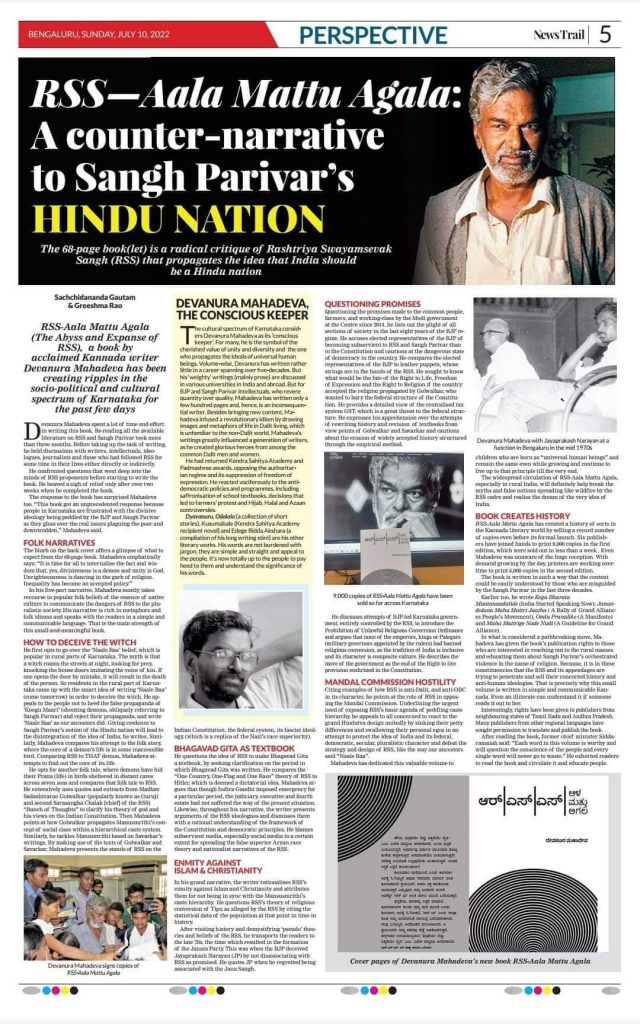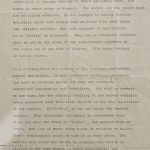RSS-Aala Mattu Agala: A counter-narrative to Sangh Parivar’s HINDU NATION
[This article is Published in NEWS TRAIL-ENGLISH DAILY-PERSPECTIVE Edition, on 10.7.2022 By – Sachchidananda Gautam & Greeshma Rao. 10.7.2022 ರಂದು – ಸಚ್ಚಿದಾನಂದ ಗೌತಮ್ ಮತ್ತು ಗ್ರೀಷ್ಮಾ ರಾವ್ ಅವರು NEWS TRAIL-English DAILY-PERSPECTIVE ಆವೃತ್ತಿಯಲ್ಲಿ ಬರೆದ ಈ ಲೇಖನ, ಪ್ರಕಟಿಸಲಾಗಿದೆ]
The 68-page book(let) is a radical critique of Rashtriya Swayamsevak Sangh (RSS) that propagates the idea that India should be a Hindu nation
RSS-Aala Mattu Agala (The Abyss and Expanse of RSS), a book by acclaimed Kannada writer Devanura Mahadeva has been creating ripples in the socio-political and cultural spectrum of Karnataka for the past few days.
Devanura Mahadeva spent a lot of time and effort in writing this book. Re-reading all the available literature on RSS and Sangh Parivar took more than three months. Before taking up the task of writing, he held discussions with writers, intellectuals, ideologues, journalists and those who had followed RSS for some time in their lives either directly or indirectly
He confronted questions that went deep into the minds of RSS proponents before starting to write the book. He heaved a sigh of relief only after over two weeks when he completed the book.
The response to the book has surprised Mahadeva too. “This book got an unprecedented response because people in Karnataka are frustrated with the divisive ideology being peddled by the BJP and Sangh Parivar as they gloss over the real issues plaguing the poor and downtrodden,” Mahadeva sald
FOLK NARRATIVES
The blurb on the back cover offers a glimpse of what to expect from the 6-page book. Mahadeva emphatically says: “It is time for all to internalise the fact and wisdom that, yes, divisiveness is a demon and unity is God. Unrighteousness is dancing in the garb of religion. Inequality has become an accepted policy”
In his five-part narrative, Mahadeva mostly takes recourse to popular folk beliefs of the essence of native culture to communicate the dangers of RSS to the pluralistic society. His narrative is rich in metaphors and folk idioms and speaks with the readers in a simple and communicable language. That is the main strength of this small-and-meaningful book.
HOW TO DECEIVE THE WITCH
He first opts to go over the ‘Naale Baa’ belief, which is popular in rural parts of Karnataka. The myth is that a witch roams the streets at night, looking for prey. knocking the house doors imitating the voice of kin. If one opens the door by mistake, it will result in the death of the person. So residents in the rural part of Karnataka came up with the smart idea of writing ‘Naale Ban’ (come tomorrow) in order to deceive the witch. He appeals to the people not to heed the false propaganda of ‘Koogu Maari’ (shouting demons, obliquely referring to Sangh Parivar) and reject their propaganda, and write ‘Naale Baa’ as our ancestors did. Giving credence to Sangh Parivar’s notion of the Hindu nation will lead to the disintegration of the idea of India, he writes. Similarly, Mahadeva compares his attempt to the folk story, where the core of a demon’s life is in some inaccessible bird. Comparing RSS to THAT demon, Mahadeva attempts to find out the core of its life.
He opts for another folk tale, where demons have hid their Prana (life) in birds sheltered in distant caves across seven seas and compares that folk tale to RSS. He extensively uses quotes and extracts from Madhav Sadashivarao Golwalkar (popularly known as Guruji and second Sarasangha Chalak (chief) of the RSS) “Bunch of Thoughts” to clarify his theory of god and his views on the Indian Constitution. Then Mahadeva points at how Golwalkar propagates Manusmrithi’s concept of social class within a hierarchical caste system. Similarly, he tackles Manusmrithi based on Savarkar’s writings. By making use of the texts of Golwallar and Savarkar, Mahadeva presents the stands of RSS on the Indian constitution the federal system, its fascist ideology [which is a replica of the Nazi’s race superiority]
BHAGAVAD GITA AS TEXTBOOK
He questions the idea of RSS to make Bhagavad Gita a textbook, by seeking clarification on the period in which Bhagavad Gita was written. He compares the “One Country, One-Flag and One Race” theory of RSS to Hitler, which is deemed a dictatorial idea. Mahadeva argues that though Indira Gandhi imposed emergency for a particular period, the judiciary executive and fourth estate had not suffered the way of the present situation. Likewise, throughout his narrative, the writer presents arguments of the RSS ideologues and dismisses them with a rational understanding of the framework of the Constitution and democratic principles. He blames subservient media, especially social media to a certain extent for spreading the false superior Aryan race theory and nationalist narratives of the RSS.
ENMITY AGAINST ISLAM & CHRISTIANITY
In his grand narrative, the writer rationalises RSS’s enmity against Islam and Christianity and attributes them for not being in syne with the Mansusmrithi’s caste hierarchy He questions RSS’s theory of religions conversion of Tipu as alleged by the RSS by citing the statistical data of the population at that point in time in history
After visiting history and demystifying ‘pseudo’ theories and beliefs of the RSS, he transports the readers to the late 70s, the time which resulted in the formation of the Janata Party . This was when the BJP deceived Jayaprakash Narayan (JP) by not disassociating with RSS as promised. He quotes IP when he regretted being associated with the Jana Sangh.
QUESTIONING PROMISES
Questioning the promises made to the common people, farmers, and working-class by the Modi government at the Centre since 2014, he lists out the plight of all sections of society in the last eight years of the BJP regime. He accuses elected representatives of the BJP of becoming subservient to RSS and Sangh Parivar than to the Constitution and cautions at the dangerous state of democracy in the country. He compares the elected representatives of the BJP to leather puppets, whose strings are in the hands of the RSS. He sought to know what would be the fate of the Right to Life, Freedom of Expression and the Right to Religion if the country accepted the religion propagated by Golwalkar, who wanted to bury the federal structure of the Constitution. He provides a detailed view of the centralised tax system GST, which is a great threat to the federal structure. He expresses his apprehension over the attempts of rewriting history and revision of textbooks from view points of Golwalkar and Savarkar and cautions about the erosion of widely accepted history structured through the empirical








